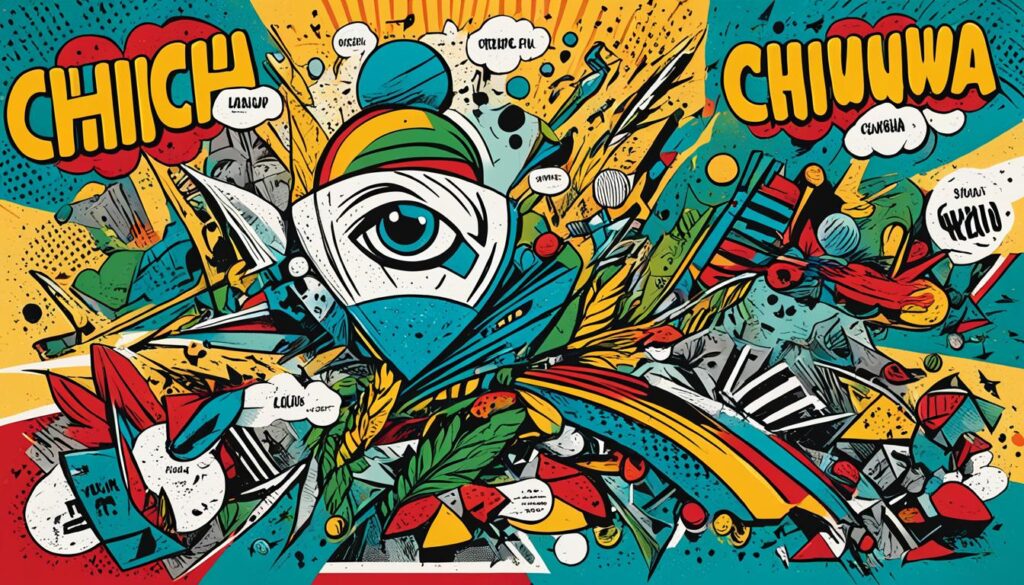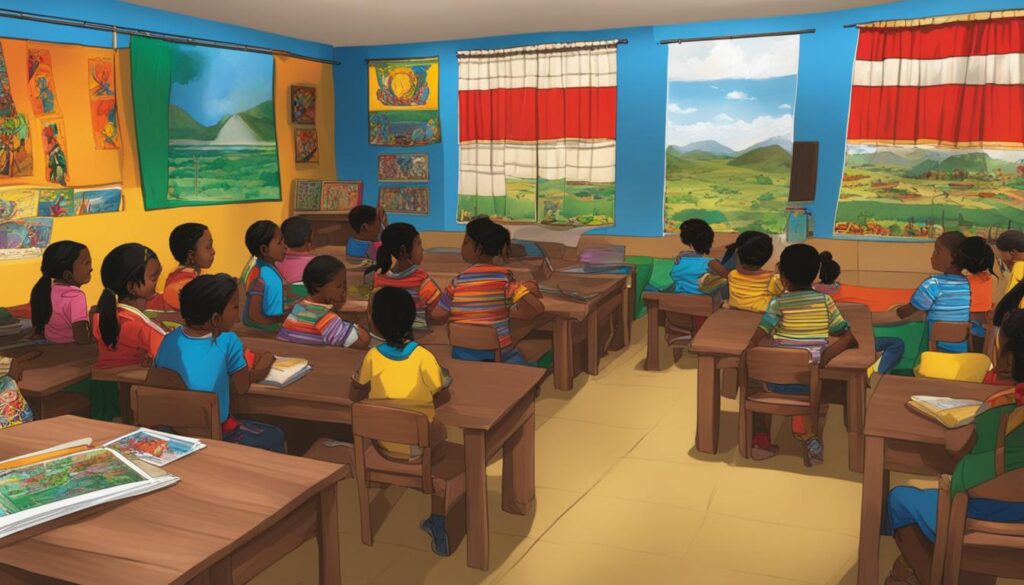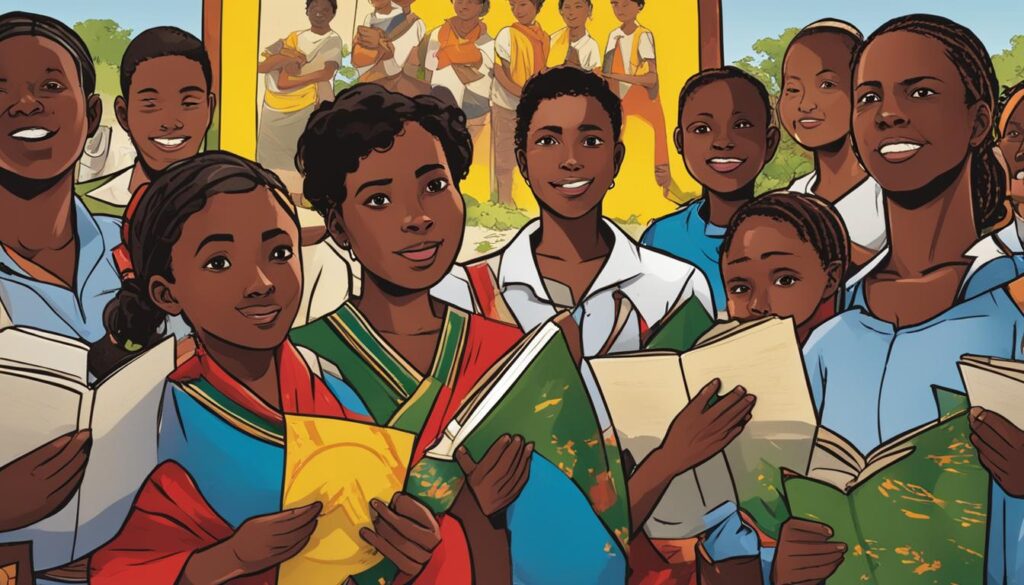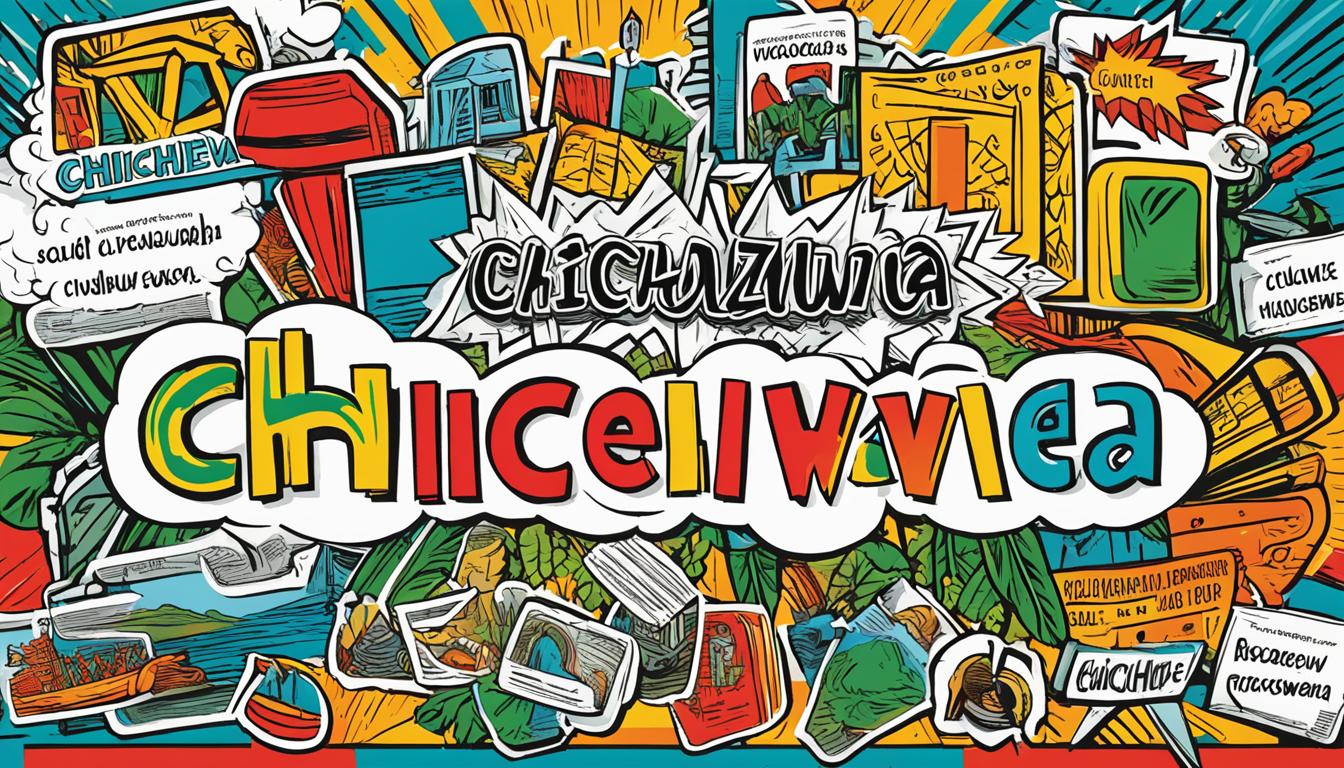Did you know that Chichewa, also known as Nyanja or Chinyanja, is one of the most widely spoken indigenous languages in Africa? With approximately 14 million native speakers, Chichewa has official language status in Malawi and Zimbabwe and is widely spoken in the Central and Southern Regions of Malawi. But its influence extends beyond the borders of Malawi, as it is also spoken in the provinces of Tete and Niassa in Mozambique and the Eastern Province of Zambia. This vibrant and culturally significant language is a gateway to understanding the Chewa people and their rich heritage.
Whether you’re looking to learn Chichewa, expand your Chichewa vocabulary, master Chichewa phrases, or explore Chichewa grammar, this article will provide you with valuable insights, resources, and learning opportunities. Let’s dive into the fascinating world of the Chichewa language and discover its history, features, importance, and future.
History and Origins of Chichewa
The Chewa people, who are the predominant speakers of Chichewa, trace their origins back to the Maravi tribe, believed to have migrated from Congo-Kinshasa to present-day Malawi in the 16th century or earlier. While the Chewa primarily settled in the Central Region of Malawi, some groups also established communities in the Southern Region and around Lake Malawi, known as Nyanja. The name “Chewa” first appeared in Portuguese documents in 1661, and since then, Chichewa has been widely spoken by the Chewa people for centuries.
Over time, Chichewa has evolved and developed various dialects and regional variations. Each region has its own distinct flavor of the language, adding to the linguistic diversity of Chichewa. The language plays a significant role in the culture and identity of the Chewa people, reflecting their rich history and heritage.
“Chichewa, a language with deep historical roots, is an integral part of the Chewa people’s identity.”
In recognition of its importance, Chichewa was officially declared the national language of Malawi in 1968. This designation highlights the cultural significance and widespread use of Chichewa in the country. As the language continues to thrive, it serves as a powerful connection between the past and the present, preserving the traditions and values of the Chewa people.
Migration of the Maravi Tribe
The migration of the Maravi tribe, the ancestors of the Chewa people, is part of the larger Bantu migration that took place across Africa. The Bantu people are an ethnic group spread across various countries in southern Africa, with a shared ancestry and linguistic heritage. They undertook a series of migrations that shaped the cultural landscape of the region.
The Maravi tribe migrated from the area now known as Congo-Kinshasa, making their way to what is now Malawi. This migration occurred centuries ago, possibly in the 16th century or earlier. The reasons for their migration are diverse and might have been influenced by factors such as political upheaval, population pressures, the search for fertile lands, or the desire for new opportunities.
Upon reaching their new homeland, the Maravi tribe assimilated with existing communities and established their settlements in the Central Region of Malawi. Through their interactions with neighboring ethnic groups, the Chewa people emerged, with Chichewa becoming their primary language of communication.
Language and Cultural Significance
Chichewa, as the language of the Chewa people, holds a special place in the cultural tapestry of Malawi and beyond. It serves as a medium for storytelling, music, dance, and other artistic expressions that have been passed down through generations. Chichewa also facilitates social cohesion and interethnic communication, bridging the gaps between diverse communities in Malawi and neighboring countries.
The preservation and continued use of Chichewa are crucial for maintaining the cultural identity and heritage of the Chewa people. Efforts to document the language, promote literacy, and support education in Chichewa are essential for ensuring its survival and transmitting it to future generations.
Chichewa Language Features
Chichewa, also known as Nyanja or Chinyanja, possesses unique characteristics that distinguish it as a prominent Bantu language. Let’s explore the fascinating phonology, grammar, vocabulary, and dialects of Chichewa.
Phonology
Chichewa phonology encompasses a set of five vowel phonemes: /a ɛ i ɔ u/. Additionally, it includes various consonant sounds, comprising plain, labialized, and palatalized variants. These distinctive phonetic elements contribute to the melodic nature of the language.
Grammar
The grammar of Chichewa is structured with specific rules. Noun class prefixes and concords are utilized, ensuring agreement between nouns, pronouns, and adjectives. Verbs exhibit inflections that indicate tense, aspect, and mood. Furthermore, tonal variations play a crucial role in conveying meaning and distinguishing words.
Vocabulary
Chichewa vocabulary showcases a rich blend of influences. Rooted in Bantu languages, it also incorporates elements from colonial languages like English and Portuguese. This linguistic amalgamation contributes to the wide-ranging lexicon of Chichewa, incorporating words for modern concepts as the language continues to adapt and evolve.
Dialects
Within Chichewa, distinct dialects have emerged, reflecting regional variations and cultural nuances. Western Chichewa is predominantly spoken in the Central Region of Malawi, while Southern Chichewa is prevalent in the Southern Region. These dialects feature unique vocabulary, pronunciation, and idiomatic expressions, reinforcing the diverse linguistic landscape of Chichewa.
To gain a deeper understanding of Chichewa’s fascinating language features, let’s explore a comprehensive table that outlines the vowel phonemes, consonant sounds, grammar rules, vocabulary influences, and notable dialects:
| Language Feature | Description |
|---|---|
| Vowel Phonemes | /a ɛ i ɔ u/ |
| Consonant Sounds | Plain, labialized, and palatalized variants |
| Grammar | Noun class prefixes, concords, verb inflections, tonal variations |
| Vocabulary | Influenced by Bantu and colonial languages |
| Dialects | Western Chichewa (Central Region) and Southern Chichewa (Southern Region) |

Importance and Use of Chichewa Language
Chichewa, the national language of Malawi since 1968, plays a crucial role in fostering cultural and national unity. This Bantu language is widely utilized in various domains, such as education and media, and serves as a lingua franca among diverse ethnic groups and regions in Malawi, Zambia, and Mozambique.
In education, Chichewa is a cornerstone of primary education, with classes conducted in the language. This not only facilitates effective learning but also reinforces cultural identity and heritage among young learners.
The presence of Chichewa in the media further reinforces its importance. Radio services and publications in Chichewa enable effective communication and dissemination of information among Chichewa speakers. This inclusion promotes the preservation and usage of the language in contemporary society.
Additionally, Chichewa acts as a powerful lingua franca, facilitating communication and cultural exchange among diverse communities in Malawi, Zambia, and Mozambique. This linguistic bridge allows individuals from different ethnic backgrounds to interact and understand each other, fostering unity and cooperation.
Embraced by both the older and younger generations, Chichewa continues to thrive as an integral part of the cultural identity and heritage of the Chewa people. Its significance and prevalence in various spheres of society highlight the enduring relevance and vitality of the Chichewa language.
| Domains | Utilization of Chichewa |
|---|---|
| Education | Primary education is conducted in Chichewa, reinforcing cultural identity and heritage. |
| Media | Radio services and publications utilize Chichewa to effectively communicate with Chichewa speakers. |
| Lingua Franca | Chichewa serves as a bridge of communication among diverse ethnic groups and regions. |
Chichewa Language Resources and Learning Opportunities
For those interested in learning Chichewa, there is a wealth of resources available to help you on your language journey. Whether you prefer online or offline learning, there are various options to cater to your unique needs and preferences.
Language Courses and Apps
If you prefer a structured approach to language learning, language courses are a great option. These courses provide comprehensive lessons, vocabulary, and grammar explanations tailored to different proficiency levels. Additionally, Chichewa language apps offer a convenient way to learn on-the-go, with interactive exercises and audio recordings to enhance your language skills.
Books and Language Reference Materials
For those who enjoy the traditional route of studying with books, there are Chichewa language books available that cover a range of topics such as grammar, vocabulary, and cultural insights. These resources serve as valuable companions in your language learning journey.
Online Platforms and Websites
Online platforms and websites provide a wealth of Chichewa language resources. These platforms offer audio recordings, video lessons, and interactive exercises to engage and immerse learners in the language. They also serve as a valuable source for cultural insights and practical tips for using the language in real-life situations.
Language Exchange Programs and Immersion Experiences
Practicing Chichewa with native speakers is an excellent way to improve your language skills. Language exchange programs and cultural immersion experiences offer opportunities to connect with native Chichewa speakers, practice your speaking and listening skills, and gain a deeper understanding of the Chichewa culture.
Chichewa Dictionaries
Chichewa dictionaries and language reference materials are essential tools for learners and researchers interested in studying the language. These resources provide comprehensive word lists, definitions, and contextual examples to aid in vocabulary acquisition and language comprehension.
| Resource Type | Description |
|---|---|
| Language Courses and Apps | Structured courses and interactive apps for comprehensive learning. |
| Books and Language Reference Materials | Books covering grammar, vocabulary, and cultural insights. |
| Online Platforms and Websites | Audio recordings, video lessons, and interactive exercises. |
| Language Exchange Programs and Immersion Experiences | Connecting with native speakers for language practice. |
| Chichewa Dictionaries | Comprehensive word lists and definitions for language study. |
No matter your preferred learning methods, these resources provide a multitude of opportunities to engage with the Chichewa language, enhance your language skills, and immerse yourself in the rich cultural tapestry of the Chewa people.

Chichewa Language in Africa
Chichewa, also known as Nyanja or Chinyanja, is widely spoken across several countries in Africa, including Malawi, Mozambique, Zambia, and Zimbabwe. It serves as a vital means of communication and cultural connection among different regions and communities.
In Malawi, Chichewa is the most widely understood language and is used in various domains such as education, government, media, and everyday communication. It plays a significant role in promoting national unity and cultural identity.
In Mozambique, Chichewa is predominantly spoken in the provinces of Tete and Niassa. The language serves as a mode of communication among the local population, contributing to social cohesion.
Chichewa also has a presence in Zambia, where it is prominently used in Lusaka and the Eastern Province. It facilitates interaction and understanding between different ethnic groups and regions.
In Zimbabwe, Chichewa is spoken by the descendants of those who migrated from Nyasaland (present-day Malawi) during colonial times. It maintains cultural ties and serves as a medium for cultural expression and heritage.
As part of the diverse African languages, Chichewa contributes to the linguistic and cultural richness of the continent. Its widespread use promotes inclusivity and enables cross-cultural communication.
Chichewa, with its widespread usage and cultural significance, bridges communities and regions across Africa.
Challenges and Future of Chichewa Language
Like many indigenous languages, Chichewa faces challenges related to language preservation and revitalization. The increasing influence of global languages, limited resources for language development, and the impact of urbanization contribute to the need for efforts to preserve and promote the language. Initiatives such as language technology development, research, and documentation play a crucial role in ensuring the future of Chichewa. Collaboration between linguists, language enthusiasts, and native speakers can help create resources, tools, and educational materials that support the continued use and vitality of the Chichewa language.
| Challenges | Solutions |
|---|---|
| Limited resources for language development | Dedicated funding and support for language preservation projects |
| Influence of global languages | Promotion of Chichewa in education, media, and cultural contexts |
| Impact of urbanization | Efforts to maintain Chichewa use in urban areas through community engagement and language programs |
“Preserving and revitalizing the Chichewa language requires a multifaceted approach that involves technology, research, and collaboration. By leveraging the advancements of language technology, we can create digital resources that make learning Chichewa more accessible and engaging. Additionally, research plays a vital role in understanding the language’s structure, evolution, and sociolinguistic context. Together, language enthusiasts, linguists, and native speakers can work towards preserving the rich cultural heritage embedded in the Chichewa language.”
With a collective effort to address these challenges, the future of Chichewa remains promising. By embracing technology, conducting further research, and promoting the language’s use, Chichewa can thrive and continue to be an essential part of the cultural fabric of Malawi, Mozambique, Zambia, and beyond.

Conclusion
Chichewa language is more than just a means of communication; it is a vital part of the cultural fabric, heritage, and identity of the Chewa people. With its rich vocabulary, distinct phonology, and unique grammar, Chichewa reflects the traditions and values passed down through generations. This language serves as a bridge that unites diverse communities, fostering a sense of national unity in Malawi, Mozambique, and Zambia.
Efforts to preserve and promote Chichewa are crucial in ensuring its vitality for future generations. By investing in research, documentation, and language development, we can safeguard the rich linguistic heritage embedded in Chichewa. Furthermore, the evolution and adaptation of Chichewa continue to enrich African languages, contributing to the preservation of cultural diversity on the continent.
As we celebrate the importance of Chichewa language and its role in Chichewa culture, let us recognize the significance of Chichewa in shaping our understanding of history, traditions, and cultural practices. By embracing and cherishing Chichewa, we contribute to the preservation and celebration of our collective heritage, ensuring that generations to come will have the opportunity to explore and appreciate the richness of Chichewa language and culture.
